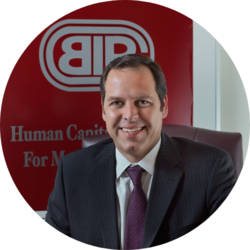
There’s a moment in almost every career when ambition collides with opportunity.
You see the role you’ve always wanted, whether it’s a C-suite position, a director role, or a move into people management, and you feel that surge of possibility. But then the question comes: Am I actually ready?
In our work with executives and managers, we’ve seen both sides of this moment. Some underestimate their readiness and hold back too long. Others step in too soon, only to realize the gaps were bigger than they thought. The difference between the two often comes down to self-awareness and preparation, not just confidence.
Here are the signs that you may be ready for the role you really want and how to spot the areas that need more work before you make the move.
Your Track Record Matches the Stakes of the Role
When you look at the responsibilities of the position, your first question should be: Have I successfully handled challenges of this scope before? This isn’t about matching every bullet point on the job description. It’s about whether your past experience has prepared you for the complexity and pressure that comes with the role.
For example:
- If you’re a team lead aiming for a manager role, have you already coordinated projects, guided colleagues, or handled client escalations?
- If you’re targeting a VP position, have you managed budgets, built teams, created strategy and made strategic decisions at a similar scale?
A Physician Leadership Journal summary of the CEO Genome Project found that high-performing leaders were distinguished not by flawless resumes, but by four core behaviors: deciding with speed and conviction, engaging for impact, adapting proactively, and delivering reliably. If your history shows you’ve done that and not just once, but consistently, you may be more qualified than you think.
You Have the Leadership Maturity to Handle the Pressure
Technical competence may get you considered, but leadership maturity gets you selected and keeps you in the role once you’re there. This is the ability to stay steady under pressure, handle conflict without escalating it, and make decisions that balance short-term demands with long-term vision.
At Barbachano International, when we assess executive readiness, we look beyond metrics and achievements. We pay close attention to how a leader earns trust, communicates through uncertainty, and manages both upward and downward relationships.
For managers, leadership maturity might show up as your ability to resolve team disputes without HR intervention or to lead a project without micromanaging. For executives, it’s about inspiring alignment across departments or regions.
You Understand the Cultural Demands of the Role
When you step into a cross-border, regional, or global role, technical skills only get you so far. What really makes the difference is cultural fluency: the ability to read the room, adapt your style, and earn trust in environments where norms and expectations vary.
It’s not about blending in perfectly. A McKinsey analysis found that leaders who build adaptability are better equipped to succeed in unpredictable markets. Research from the Center for Creative Leadership shows that leaders who can adapt their approach to different cultural contexts build stronger collaboration and trust within their teams.
For a manager, that could mean guiding a team where communication styles and priorities vary from one person to the next. For an executive, it might mean setting a strategy that works across different countries or business units. In both cases, cultural understanding isn’t just nice to have; it’s what turns good leadership into lasting impact.
You’ve Tested Your Readiness Through Feedback
Even the most self-aware professionals can have blind spots. That’s why the best candidates seek out feedback long before they apply for a bigger role.
Mentors, trusted peers, and former managers can give you an unfiltered view of where you’re strong and where you need development. Ask specific questions like:
- “Do you see me ready for this kind of role today?”
- “Where would you bet on me and where would you hesitate?”
For managers, this might mean asking a senior leader for an honest assessment after you’ve led a key initiative. For executives, it might involve structured 360-degree feedback or professional career coaching.
You’re Clear on Why You Want the Role
Finally, readiness isn’t only about what you can do; it’s about knowing why you want the role in the first place. The professionals who thrive after stepping into a new position almost always have a clear, grounded reason for making the move.
That sense of purpose is what keeps you steady when the transition gets tough. Without it, even highly qualified leaders can lose focus or make decisions they later regret.
Take the time to put your reasons in writing. If you’re a manager, maybe it’s about guiding a team to new levels of success or building skills you haven’t yet mastered. If you’re an executive, it might be about creating impact on a broader scale or aligning your work more closely with your values. When your “why” is clear, the challenges feel less like roadblocks and more like part of the journey.
The Bottom Line
Readiness is rarely an all-or-nothing state. Most professionals are ready in some areas and still developing in others. The goal isn’t to be perfect before you leap; it’s to understand your strengths, acknowledge your gaps, and take proactive steps to close them.
If you can point to a proven track record, leadership maturity, cultural fluency, constructive feedback, and a clear sense of purpose, there’s a good chance you’re ready for the role you want, whether that’s managing your first team or leading at the highest level.
And if you’re not quite there yet, the work you put in now will make you that much stronger when the right opportunity comes knocking at the door.

By Fernando Ortiz-Barbachano
President & CEO of Barbachano International
Barbachano International (BIP) is the premier executive search and leadership advisory firm in the Americas with a focus on diversity & multicultural target markets. Since 1992, BIP and its affiliates have impacted the profitability of over 50% of Fortune 500 Companies. BIP has been recognized by Forbes as Americas’ Best Executive Search Firms and currently ranks #8 and #3 on the West Coast.


